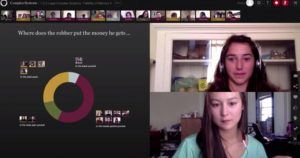The Minerva Project: The Next Era for Higher Education?

Digital revolution has made it remarkably easy to acquire any knowledge or hard skills. In the digital era, what should be the new role of higher education? Minerva Project has an answer.
What the combination of the internet and greater access to mobile has enabled is, when you stop to think about it, is very remarkable. The access to information has become extremely fast and easy, and the data we can access through the internet gets updated so frequently at a very low cost. This phenomenon has led to two important results:
- Having knowledge on the top of one’s mind is not as hard, and therefore not as valuable as before.
- It is becoming increasingly important what one does with knowledge rather than if one has knowledge.
One class of traditional institution is facing a very large challenge due to the two conclusions made above: Higher education systems are not adding a lot of value to students by only teaching hard skills that are very easy to acquire from the internet and must shift their value proposition to continue adding value to the society. The last few years have seen a boom in ed-tech startups, like Coursera, Udacity, and Codecademy, all of which focus heavily on teaching students the skills they need to land or switch jobs.1 As content knowledge becomes more accessible, the skill of the modern academic must shift away from being an distributor of knowledge to being an integrator of knowledge, creating more personalized conditions that help students learn.2
The Minerva Project – A new globalized way of higher education
The Minerva Project and its founder Ben Nelson, the former CEO of Snapfish, are making a very prominent step towards the new way of higher education. What Minerva offers, according to their website, is ‘an innovative undergraduate program that combines four years of world travel with rigorous, interdisciplinary study 3’.
The founding idea of Minerva is that in a world where information is never more than a click away, what matters most is not what you know. The critical thing is how you analyze and interpret that information. Therefore, the school is strictly against teaching any hard skills. You won’t find any of the typical 101 courses in its freshman curriculum. The first-year students take courses with curious names such as “Empirical Analysis” and “Multimodal Communication” instead. The entire first year at Minerva is dedicated to teaching three vital things only: critical thinking, creative thinking, and effective communication.1

To facilitate the education of world leaders, Minerva Institute offers a global experience facilitated by digital tools and small group learning: All of Minerva’s classes are live seminars with less than 20 students to a professor. All classes are conducted using live video conferencing platform that enables the institute to easily incorporate the latest science of learning techniques – small group learning, instant feedback, polling, etc. After their first year in California, students travel to seven major cities around the world for the rest of their 4-year education. The system values the ‘city as your campus’ approach to the traditional campus life.4
In this business (or teaching, if you will) model, the critical customer (or student) promises of Minerva are accessibility and diversity. Since the school is not limited by campus space, once any American or international student passes the bar set by school, they are in. The founder Ben Nelson notes: “What will never happen at Minerva is a student who is qualified who meets our bar but we say, ‘we already have too many of you, so you’re rejected,'”. In alignment with this promise, the school’s annual tuition is only $10,000, much lower than a typical Ivy league program.5
What will define future success?
The sustainability of the program will be determined by financial viability and demand sustainability in the long term.
For the first point, Minerva hopes, by being narrowly focused, appealing to a huge pool of untapped demand, and dramatically reducing costs by eliminating the traditional campus, they can be a big player in that business and have a sustainable financial structure.5
For the latter, the determinant will be how successful Minerva is in preparing the students for life after school, mainly for their careers. The best way to measure this is seeing the recruiter interest in hiring from the institution. The school currently has relationships with a set of top global organizations across a variety of categories. The school notes that ‘… through regular consultation with this advisory group, […] the skills you learn are directly applicable to employers.’ Very reputable players across industries such as McKinsey & Co. , Google, Goldman Sachs, Dalberg currently sit on the advisory board.6
Still, for all its pedagogical complexity, it’s still possible that the corporate world just won’t buy into this new experiment in education. The educational system involves a lot of legacy that is hard to change. We will hopefully be able to better assess the future success once the school produces its first graduates in 2019.
[798 words]
[1] https://www.wired.com/2014/10/minerva-project/
[2] http://www.smh.com.au/national/education/digital-disruption-and-academia-are-we-ready-for-uberversities-in-10-years-20150930-gjxvor.html
[3] https://www.minerva.kgi.edu/
[4] http://www.huffingtonpost.com/c-m-rubin/the-global-search-for-edu_b_8110814.html
[5] http://www.businessinsider.com/the-pitch-for-the-minerva-project-2013-1
[6] https://www.minerva.kgi.edu/career-development/



Dicle, this was a fascinating read! I like that Minerva is battling two distinct conventional setups – one is using the MOOC model (versus the traditional college model) and the other is the new curriculum around skills (and not knowledge). Each is a battle that will define the role of education in our times and it shows how ambitious Minerva is that they are fighting both battles simultaneously!
On the first design choice — this reminded of a NYT article on MOOCs and why they aren’t disrupting college education yet [1]. The author’s thesis is that what students are paying colleges for are official degrees, “the kind that can get you a job” – exactly your point in the article. They need to create a brand powerful enough to attract employers
On the second — This reminded me of the graph on the drop in middle-skill jobs we saw in class. I think this model will work well to attempt to bridge this gap – the difference b/w machines and humans is that machines will outperform humans in any deterministic, repetitive task. By teaching humans problem-solving that is not intuitive to machines, Minerva is trying to retain humans’ competitive advantage. I hope it works!
[1] http://www.nytimes.com/2015/03/08/upshot/true-reform-in-higher-education-when-online-degrees-are-seen-as-official.html
This was the best post I have read so far! Congratulations, Dicle. It is indeed fascinating to see how The Minerva Project is trying to disrupt an industry that has only seen, in my view, incremental change since it was created.
I believe the key issue for this project is to remain viable during the next 10-15 years at least. As much as I think it makes sense conceptually, it will be harder to scale this massively without some “proof of concept”. And the burden will be on the first generation to graduate from this project to prove they can do better than the others. Otherwise our human nature will resist change and retain the old style of teaching.
Thanks for a great post: Minerva is fascinating to me. They’re taking bold moves and challenging us to think about what a university experience should really be. I think the key for them to be successful would be to somehow demonstrate that their pedagogy is more effective in allowing students to be critical thinkers and that their students have higher rates of long term success in their careers as opposed to those from other universities. How they’ll be able to do this is going to be a challenge and will be very interesting to see!
This is really interesting. Thanks, Dicle! I really like the approach Minerva is taking, including how it incorporates the social aspects of a typical undergraduate experience with a digitally-delivered core education. I know this is a key positive element of education for many, producing both friends and a professional network.
I wonder whether Minerva could market itself to potential students by partnering with high schools to deliver brief versions of its courses in e.g. critical thinking to students. I know this was taught at my high school but no teachers had a core competence in the subject. This would introduce students to the concept of online education, increasing awareness and generating applications.